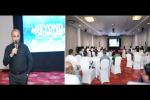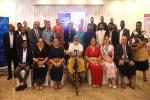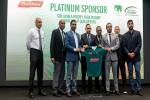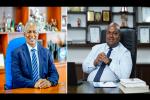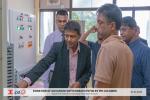Held during the first week of March at the MAS Athena in Thulhiriya, participants included English teacher educators in the state sector, lecturers at the National Colleges of Education, Teacher Training Colleges and Teacher Centres, Regional English Support Centres and in-service advisors from the provinces.
Among the regional participants were teacher educators from Nepal and Afghanistan.
Gracing this special occasion were several officers of the Ministry of Education including Ms Maheshi Weerauriya, Director English and Foreign Languages Branch, Ministry of Education, Mr Sanath Jayalath, Deputy Director of the same branch , Dr Darshana Samaraweera, Director, Department of English, National Institute of Education, Presidents of the National Colleges of Education, Provincial English Coordinators and representatives from the Regional English Support Centres.
The overall theme of the conference was ‘English language teacher education in the 21st century’ and explored challenges faced by teachers and the techniques, tools and methodologies that need to be deployed to support and assist the teachers.
The Teacher Educator Conference grew out of the British Council’s work with teacher educators, both pre and in-service, in the state sector in Sri Lanka.
Although there have been many conferences run by the Sri Lankan English Language Teachers Association (SLELTA) for English teachers, there has never been one for English teacher educators.
Thus organising the event was timely and ideally positioned to showcase and share the work of both local pre and in service teacher educators.
The event also provided a platform to showcase and share the work of other non-project teacher educators both in the country and in the region.
Four sub-themes were chosen by the Community of Practice (COP), a British Council initiative jointly with the Ministry of Education, to assist teacher educators to share best practices and provide an appropriate forum to collaborate.
The resulting conference was specifically for Sri Lankan English language teacher educators.
The specific themes chosen reflected the areas that the Teacher Educator Community of Practice felt were the most important issues and challenges facing Sri Lankan English language teacher educators today.
Thus the key messages of the conference included Digital trends where English language teaching is being impacted hugely by technology, Observation and Feedback with face to face observation and feedback being recognised as one of the most impactful tools in education, Teaching literature and its importance in terms of the curriculum which English language teachers have to implement in the classroom and the challenges and opportunities stemming from it, and finally Speaking and listening accepted as the most recent challenge in English language teaching in Sri Lanka as these skills are crucial to the youth coming into the workplace and vital that they need to be developed.
The keynote speaker at the conference was Dr Shashikala Assella who spoke on literature.
Plenary speakers included Dr Bimali Indrarathne who explained speaking and listening, Psyche Kennett elaborated on observation and feedback while Karen Waterston discussed the digital aspect.
Commenting on the conference, Gill Caldicott, Country Director British Council, said, “The Sri Lanka English Language Teacher Educator Conference (SLELTEC) 2020 was highly commendable and insightful.
We believe the engaging sessions, informative workshops and overall programme covered a rich spectrum providing a valuable learning process, imparting significant knowledge and experience for the participants.”
Mr Sanath Jayalath, Deputy Director English and Foreign Languages Branch, the Ministry of Education added, “The Teacher Educator conference jointly hosted by the Ministry of Education and the British Council is an extremely timely event engaging participants around the latest trends in teaching, including practical ideas, strategies, and tools to facilitate ongoing professional development and address common challenges.
We are pleased the attendees had opportunities to interact with leading experts in the field, network with peers and contribute towards a conference publication showcasing local and regional best practice.”
Mr R M D Rohan, participant and lecturer, at Pasdunrata National College of Education, noted, ““I was very pleased with the entire conference.
It was a nice opportunity to meet and speak with other teacher educators sharing common knowledge and challenges in present times..
I was able to gain new knowledge and understanding through the presentations and hope to apply my learning in the classroom.”
The conference is being hosted by the British Council as part of its overarching education reform project, TRANSFORM. Since 2017, the Improving Teacher Education in Sri Lanka (iTESL) Project has been conducted with materials developed based on the needs of both sectors.
The roll out of courses on developing and assessing speaking and listening skills has just commenced.
Todate, teacher educator courses have been delivered to over 100 teacher educators in the National Colleges of Education and mentoring and ELT methodology courses have been delivered to over 200 in service advisors and senior teachers.
About the British Council
The British Council is the UK’s international organisation for cultural relations and educational opportunities.
We work with over 100 countries in the fields of arts and culture, English language, education and civil society.
Last year we reached over 75 million people directly and 758 million people overall including online, broadcasts and publications.
We make a positive contribution to the countries we work with – changing lives by creating opportunities, building connections and engendering trust.
Founded in 1934 we are a UK charity governed by Royal Charter and a UK public body.
We receive 15 per cent core funding grant from the UK government. www.britishcouncil.org

